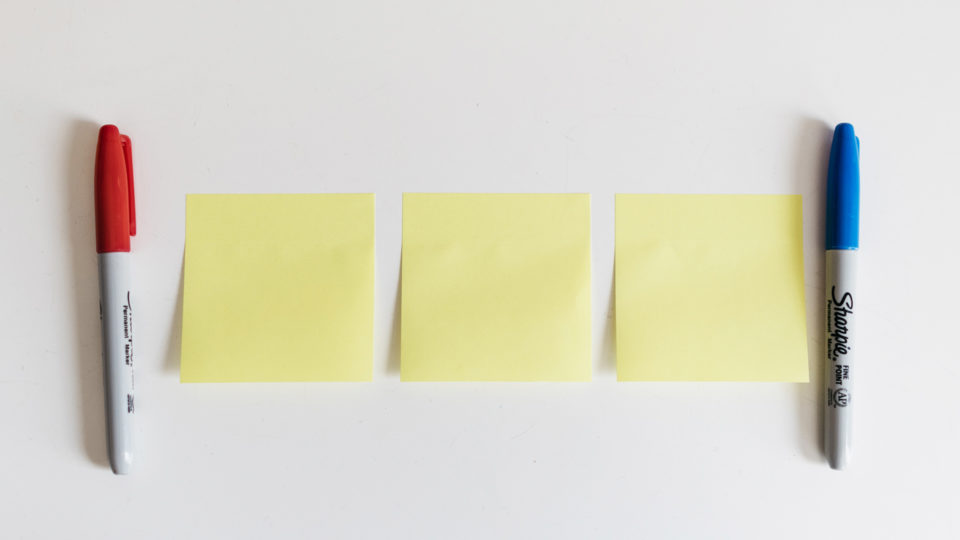A few months back, I co-hosted a UX careers meetup with UX designers, as part of the Interaction Design Foundation – London branch.
Taking place at London’s Space4, it was a chance to discuss how we can grow in UX, how to find UX jobs, how to build careers, what makes a good UX portfolio and more.
In the spirit of sharing things of value, here are the notes from the day:
UX Interviews
Lauren, a starting-out designer, observed that in a recent UX interview, as her potential employers looked over her portfolio she noticed that they were more interested in the processes she went through in her work than the final design. They were interested in the research and the iteration, rather than the final output.
In a similar vein, Kayleigh from the tech agency Outlandish agreed that being able to show good process was an important skill and appreciated by prospective employers.
For example, when taking a test as part of the interview, if you do something so simple such as save out the work properly in a format that the wider team can use, this demonstrates that you know the correct processes.
Tools and the UX job search
This carried over into your choice of UX tools.
In short, amongst those who’d been to interviews recently, it was felt that interviewing companies didn’t seem that bothered about which tool you were most familiar with. It didn’t matter if you were a Sketch person, or XD person, or whatever; it was more important to demonstrate that you’re good with the process of design.
The tool isn’t you. You can learn the tool.
Wireframing skills and the UX job search
Kayleigh from Outlandish wasn’t interested in recruits showing finesse or fidelity of a wireframe, but more that they were able to demonstrate clarity of a concept.
“We value the skill of being able to sit, sketch on paper with a client and be able to show the user journey and layout. Our test of a good wireframe isn’t the finesse or straight lines. It’s whether someone can walk over and understand exactly what it is.”
Kayleigh Walsh, Outlandish
How to find UX jobs
“Call the company and tell them that you emailed. They like it and it’s a nice touch.”
Lauren
Lauren again observed that, one time, she missed the deadline to submit an application but submitted anyway. She called the company, told them that she’d missed the deadline but had submitted. And then she was added to the final round of candidates.
Kayleigh at Outlandish told us that Outlandish only work with people we meet. So we should all go to events! Go to meetups! Go to parties! Relax and chat to people there bout what interests you.
That’s how the Outlandish team discover interesting people and learn about the things that motivate them and they enjoy working on. From there, the Outlandish team might want to start collaborating with them and they’ll reach out to them to ask them to come to an interview.
Culture Fit
Does culture fit matter when you’re looking for work?
We all felt: yes. Because you’re going to be at the company every day, it’s important to research and find a fit that feels good for you
Tip: Research the companies you’re applying to. Look at their finished projects or portfolio. Depending on who they work with, you’ll get a feel whether this is a nice place to work in.
Ask yourself: Do this company work with nice people? Do they seem flexible? Are they ethical?
Again, Kayleigh from Outlandish, added:
“When we’re talking to potential designers, we want to hear that they believe in similar things that we do (fairer society, positive social impact, ethical behaviour etc). It’s important for us to work with people who aren’t just in it for the money.”
Kayleigh Walsh, Outlandish
UX Mentors
Get one. Mentors are really useful, either in a formal or informal capacity. And it’s easier to get one than you think.
All you need do is just ask a designer you know or are friends with for some occasional support or the chance to have a regular conversation… and hey presto, now you have yourself a mentor.
If you are looking for more formal mentoring opportunities, you can start your search at:
- UXPA’s mentoring programme
- Hexagon UX‘s mentoring programme, designed to support women and non-binary people working in UX.
“Hexagon UX’s mentoring programme is like speed dating for mentors!”
Tell employers what you’re learning
Is it worthwhile telling interviewers what you’re studying? Is it a good idea to tell prospective employers that you’re taking courses at the Interaction Design Foundation or elsewhere?
Yes. Tell people you’re doing courses. It shows you’re interested and always developing yourself.
UX hackathons
Rosie, a junior UX designer, advised that we should all do them. You learn so much, they’re very galvanising and the work you do there tends to go straight into your portfolio.
What happens at a hack?
You get mixed up into groups and work with people to make something. It’s intense. You also learn about the business case around the products you’re designing, which is something you might not experience in a learning environment.
It’s worth pointing out that anyone can join a hackathon, and you don’t need tech skills. Hackathons often have lots of developers and are actually short of designers. So if you go, you’ll be in demand!
There are hackathons everywhere. Small to big ones. And if you’re interested in political or ethical based hackathons, you can take a look at NewSpeak House, which often hosts politics-based hacks.
UX careers resources
- Behance Live – they do a tutorial every day
This being an Interaction Design Foundation meetup, we also shared the courses we’re all doing and can recommend:
- Perception and Design
- Emotional Design
- Information Visualisation
- UX – The Beginners Guide = good for interview practice and to help you answer interview questions
- Design Thinking = quite theoretical but a good one for understanding the design process
- The Practical Guide to Usability
Coworking spaces – good to find work opportunities
We discussed how if you’re actually in a space you end up talking to people and collaborations and opportunities just tend to start happening.
So consider joining a coworking space that has a very open, collaborative atmosphere.
Space4 is just one such coworking space. Based in London’s Finsbury Park, it’s home to a lot of smaller non-profits and developer teams who would probably love to meet UX designers and collaborate.
A stay at Space4 might lead to a good conversation and a great portfolio project… or even might help a startup get funding and further paid work.
And that’s it! Those are all the notes. Hope that’s all been of interest.

